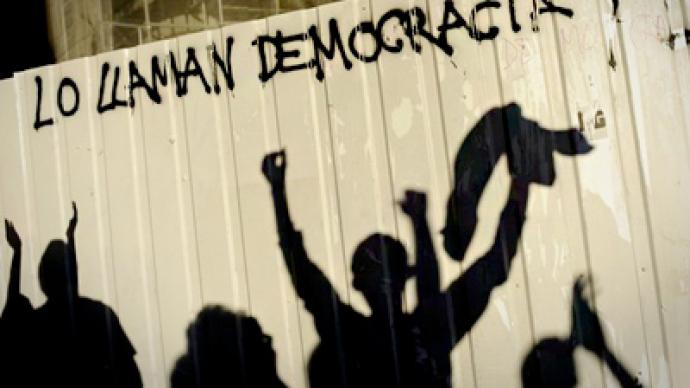Signals Spain may seek bailout spelling disaster for eurozone

Violent protests against austerity cuts have broken out in Spain, as the country struggles to deal with record-high unemployment signaling that Madrid could possibly be next in line for an EU bailout.
EU finance ministers have unanimously backed a US$110 billion (€78 billion) bailout package for debt-stricken Portugal.The ministers are also to discuss extending loans to Greece, which, despite already receiving a US$155 billion bailout, is in no better shape.The latest efforts to prevent eurozone members and the single currency falling into the financial abyss begin later on Monday when European ministers meet to discuss the effectiveness of bailouts for Lisbon and Athens. As for the latter, concerns have already been raised that the measures are not working in Greece.The eurozone bailouts grow in number – first Greece, then Ireland, then Portugal – now there are serious concerns that Spain could be the next to topple.Protestors throughout Europe are clamoring to oppose even more taxpayers’ money being ploughed into rescuing others.Thousands of people took to the streets of Madrid to oppose savage austerity measures that the government has put in place and to protest against high levels of unemployment.But with 43 per cent of under 25-year-olds out of work and an inflexible labor market, the problems show no sign of easing.“It’s going to be a long fight. This is only a beginning. But we are here to show the government that we will come out in our millions,” promises a protestor.If the eurozone’s problems were not enough, there is now talk of Greece defaulting on its loan and even potentially ditching the euro altogether. And Portugal’s recent bailout is reported to be worth €78 billion.But Spain, as the eurozone’s fourth-largest economy, would be a different challenge altogether if it failed.“If this situation happened, the markets would not manage it,” shared Juan Manuel Lamet, economist of Expansion newspaper. “Buying out Spain’s debt is the most catastrophic scenario for the EU.”“What will the EU do? I think – and many expert share my opinion – that the EU will do the utmost to avoid this scenario at any cost, because Spain is simply too big to fail”, Lamet evaluated.The big question now is just how much longer can the eurozone continue bankrolling those going bust? And as the spiraling debt crisis continues to escalate, eurozone ministers are struggling to maintain a united front.“The plan of financial survival for such countries as Spain would seriously endanger the euro. It could lead to the appearance of two currency zones in Europe: a strong group of countries using the euro, and the rest not using the euro,” says José Antonio García Rubio, Manager of Economy at Izquierda Unida.“The European Commission will take time to think over their decision before adapting measures of this kind.”Spain has continued to play down speculation that it will be the next European country to ask for a bailout. But as problems continue in Greece, Ireland and now Portugal, the possibility of Spain becoming the next eurozone country to fail remains a very real risk. Right now the European ideal and the reality have never seemed so far apart.
The situation with the Spanish economy is very complicated, but probably the biggest problem is the unemployment rate that has reached 21 per cent, Javier Diaz-Gimenez Professor of Economics at the University of Navarre says. He does, however, believe the situation is far from catastrophic.The national bailouts in the EU are “a sign that the euro project needs stronger institutional support and stronger political commitment.”“As long as the euro area sees itself as ‘us’ versus ‘them’, it is clearly not going to work out. You need some form of fiscal tranches of the euro area-wide institutions if you want to keep the euro project going. Otherwise, sooner or later the euro will fail,” warns Diaz-Gimenez.













